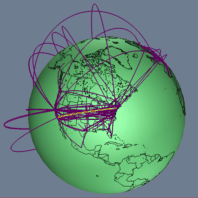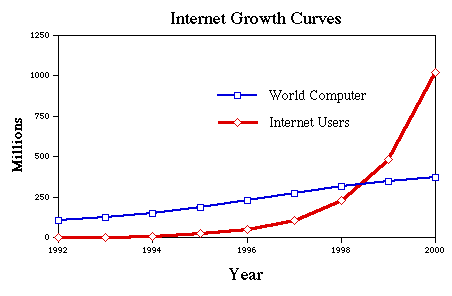| g e n u i n e i d e a s | ||||||
 |
 |
 |
 |
 |
 |
 |
| home | art and science |
writings | biography | food | inventions | search |
| collision in cyberspace |
|
(written in 1996) The net is big. Really big. Spilling onto the desktops of millions of people, gathering more news coverage than your average natural disaster, the Internet siphons bits from the most remote pockets of the globe. But no matter how big it seems today, tomorrow the net will be even bigger. Doubling every year since the late 1970's, today's 30 million surfers will grow to 60 million in 1996, 120 million in 1997, 240 million in 1998 and a globe girdling 480 million in 1999.
(Domains image reproduced with permission from http://www.cybergeography.org/atlas/atlas.html ) With fearless abandon, Nicholas Negroponte, director of MIT's Media Lab, predicted in the June, 1996, issue of WIRED magazine that the Internet will boast nearly one billion users by the year 2000! But why stop there -- why not extrapolate a third decade of unbroken growth? Well, for one thing given current growth rates, by 2003 there will be more people surfing the net than living on the planet. For another, in 2001 (when there is nearly half as much Internet as people), the next four billion users thoughtlessly live a day's journey from a phone. As much as I enjoy peering into our collective electronic psyche, the next two billion users might prefer eating over navigating the web. Exponential growth is real, but so are limits to growth. A single bacteria dining on a vat of sugar water can double every hour until it's progeny run out of food. Even if you aren't fluent with exponential growth, common sense dictates if you start with 100 pounds of sugar water and one bacteria, you can't rear more than 100 pounds of bacterial offspring. Similarly, if you want to estimate how many people could possibly attend a Swirlies' concert, you might extrapolate ticket sales from the last few year's performances. But no matter how many people like their music, realistically you can't sell more tickets than actual concert seats. Well, to surf the net you must have a seat at a computer. As long as there are fewer surfers than computers, it's a day at the beach for Internet growth. But the number of PCs are growing by about 17% a year, while the number of web surfers are exploding at about 200% a year! (And that's 17% at best; in reality only 7-10% a year are sales of PCs to new users. The remaining PCs are replacements for out-of-date hardware or a second machine for the kids. And a mere one in four computers is connected to a network.)
So something's got to give. By 1998, when there are more surfers than surfboards, the net's growth will be terminally limited. No problem, you say, all we have to do is invent some other device to surf the net instead of a computer. And since computers are expensive and frustrating, might as well make them cheap and simple to use at the same time. (Hmmm, wonder why nobody thought of that before?) For every PC sold, ten appliances like TVs, radios and cellphones are shipped. So, why not slap some software and a modem in a TV, and watch the market explode? Netscape browsers in every new car! Microsoft Explorers in every phone! Internet appliances in every TV! Whether Internet appliances eventually catch on (and there are sound underlying social and economic reasons to think they won't) there are limits to how fast any new electronic gadget can be adopted. Earlier networked devices, like color TV's or cellular phones, took over a decade to reach 10 million units -- even VCRs took five. Which means even the most attractive internet appliances can't short circuit the collision of '98. If we can't get more devices into people's hands, perhaps we can get more hands onto the same number of devices. In the early days of the telephone and telegraph, small stalls popped up on every street corner selling communications services. Even today, community phones are a common sight in emerging countries. So you might imagine a hundred people sharing one computer, surfing the net to see the world or bring down a local dictatorship. Community centers might serve up an e-zine with the morning coffee. Schools could put each student on line for their shot at fifteen minutes of fame. With sharing, a few hundred million people might touch the hem of the Internet before the end of the decade. But wandering down to the corner stall for a daily fix of e-mail and hot links isn't the total immersion experience we think of as Internet access. You need time, disposable income and a computer. And this distinction matters. It matters to the people with money. If you expect advertisers to subsidize on-line costs as they do with toll-free numbers and TV, expect them to get a lot more excited if they can reach a billion active users rather than one hundred million tourists. If you expect Internet programmers to stay up through the night, abandoning all hope of a normal life to build the latest cool site, you must lure them with the promise of unimaginable wealth. And the best source of unlimited wealth is the stock market of the 90s. In the 60s the market backed solid, dependable blue chip stocks which yielded safe, consistent dividends. In the 70s the market was stagnant while the country reexamined its priorities, and in the 80s junk bonds gave non- traditional companies a new infusion of cash. This cash ignited a fire storm of innovation and real stock appreciation. But in the 90s people started packing for Pluto, searching for a market rooted outside the grimy world of profit and loss, for one orbiting a virtual space. A universe where profit, even the prospect of sales, is irrelevant. The ultimate triumph of mind over money, the 90s are the era of concept stocks. To launch a concept stock, cook up an idea over late night pizza (say, the first Internet virtual reality/bowling alley/laundromat). Then hack together a prototype, put it up on the net, and wait for the venture capitalists to descend. And descend they will -- the market is flooded with baby-boomer cash just crying for a good time. Bring the concept public in an IPO and watch the money roll in. No customers required, of course, not even a plausible revenue stream to justify the stock's astronomical value -- why bother when the concept sounds so good? And this gold rush, this South Sea Bubble, will burst when the net's growth is a more reasonable 25 percent a year. So, here's my prediction. Sometime around the middle of 1997 the market will wake up, alerted up by the deafening sound of imploding Internet appliances. Articles heralding the demise of the web will soon fill the papers like so much soggy fish and chips. Concept stock prices will plummet, even though a hundred million people are still out surfing the net. And a new paradigm will emerge. The market in the last 30 years has shifted from steel to services to speculation. The next step is clear -- the watchword for the double-zero's decade will be Eureka stocks. Instead of investing in a product or a service, you'll invest in people who might someday have a good idea. You could buy a share in Jim Clark Commodities. He'll take your money while you wait for him to have a good idea. The stock rises when Jim is observed staring thoughtfully into a spectacular sunset; it falls on a report that Jim is having trouble deciding what to eat for dinner. Malone Mutual Funds. Huizenga Hedges. Diller Derivatives. No messy customers. No pesky balance sheets. And in this world nobody ever asks if there are enough surf boards to catch the next wave.
Greg Blonder is a scientist in the communications industry. He works with computers all day long and enjoys their company. Really. Comments can be sent to author here
|
Contact Greg Blonder by email here - Modified Genuine Ideas, LLC. |

